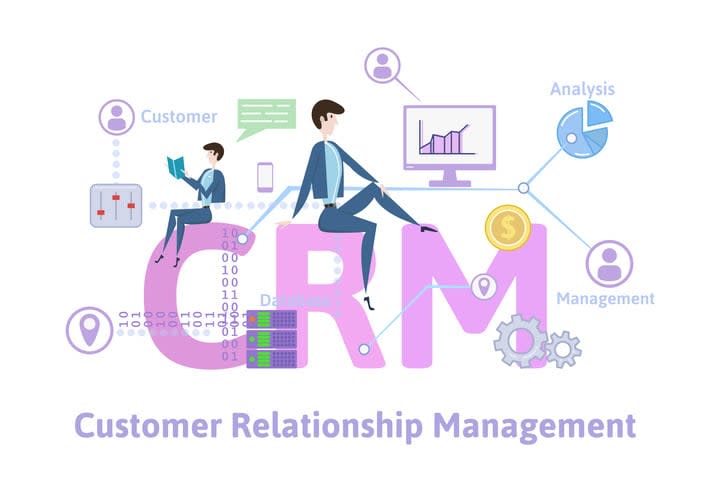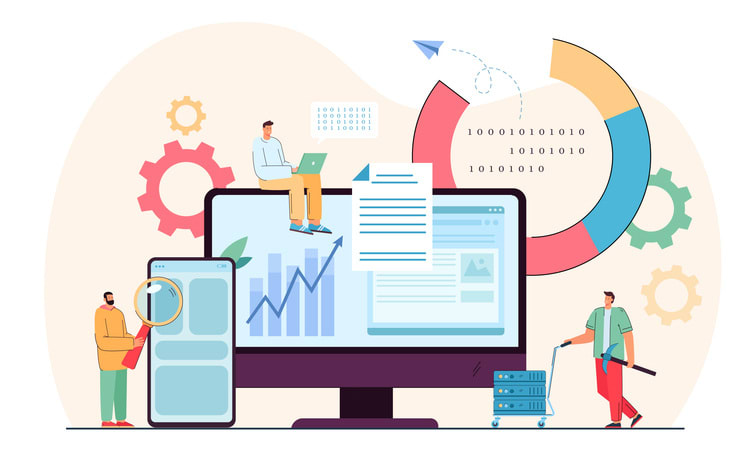What do small businesses need from a CRM system? With limited resources but big ambitions, CRM small business tools must meet their budget, streamline operations, boost efficiency, and elevate customer service. This article breaks down CRM essentials for small businesses, highlighting cost-effective solutions and critical features that drive real results without fluff or overselling. Discover how CRM software can become your small business’s game-changer.
Key takeaways
- CRM software is critical for small businesses. It consolidates customer data, automates workflows, and provides insights for informed decision-making, improving customer relationships, streamlining operations, and boosting sales and marketing efforts.
- Key features of an effective CRM for small businesses include an easy-to-use interface, customization and scalability, and robust integration with existing tools and applications, which optimize workflows and enhance overall efficiency.
- In 2024, CRM trends for small businesses focus on artificial intelligence integration for predictive analytics and enhanced customer engagement, the rise of industry-specific CRM solutions, and the growing adoption of CRM systems due to their increased affordability and usability.
Why small businesses need CRM software

Small businesses need to leverage every opportunity to stand out in a fiercely competitive landscape. This is where CRM software steps in, acting as a catalyst for enhancing customer relationships, streamlining business processes, and boosting sales and marketing efforts. By consolidating customer data and managing customer interactions, CRM software enables small businesses to personalize their marketing and sales strategies, improving customer relationships.
Moreover, a robust CRM system allows small businesses to:
- Streamline their operations by organizing voluminous data
- Improve sales strategies using information and insights
- Boost team and business efficiency
- Enable better sales pipeline management, especially for small businesses with limited resources.
Implementing CRM software is not just a strategic decision but a game-changer for small businesses that aim to improve customer relationships, streamline operations, and enhance overall efficiency.
Alongside CRM, businesses need to address the change in work patterns, using virtual office platforms like Kumospace to help migrate to remote and hybrid environments, where any type of productivity and analytics software can be shared and collaborated over, as teams master the art of remote working.
How to improve customer relationships
Successful customer relationships are built on understanding and meeting customer needs. CRM systems help businesses in the following ways:
- Consolidate customer data
- Craft relevant marketing strategies
- Enable personalized product and service offerings based on CRM data
- Facilitate the creation of long-term customer relationships
Furthermore, CRM systems:
- Bolster a seamless omnichannel customer experience across various company platforms
- Integrate social media platforms to understand customer behaviors and preferences
- Help prioritize customer requests and improve customer service with Natural Language Processing by effectively handling routine inquiries.
In essence, CRM systems are at the heart of enhancing customer relationships.
Streamlining business processes
Efficiency is key to the success of any small business. CRM software offers the following benefits:
- Centralizes accurate data
- Offers automation features
- Reduces the dependency on manual data management
- Significantly improves efficiency and productivity
- Provides standardized sales pipeline stages
- Offers an intuitive interface
By utilizing CRM software, businesses can simplify workflows, concentrate on nurturing relationships, and close deals more effectively. In addition, CRM systems offer the following benefits:
- Act as content repositories, enabling easy management of templates and documents
- Streamline processes
- Save time through advanced automation
- Allow companies to concentrate on nurturing relationships and closing deals
Using Kumospace, all these benefits and the underlying apps or documents can be shared with the team, technical or business issues can be raised and resolved, helping workers focus on delivering business benefits.
Boosting sales and marketing efforts
CRM tools are instrumental in enhancing sales and marketing efforts. They can help with:
- Organizing email campaigns
- Managing email lists
- Sending personalized bulk emails
- Creating personalized email marketing campaigns with customizable email templates aligned with customer data
- Assessing performance through metrics like email open rates, reading duration, and click-through rates
These features enable effective email marketing.
In addition to this, CRM software offers the following benefits:
- A/B testing capabilities
- Performance tracking for emails
- Refining marketing strategies based on data such as click-through rates
- Increasing lead management capabilities by centralizing customer data
- Improving the efficiency of interacting with leads and tracking their conversions through the sales pipeline
Additionally, CRM systems provide analytical features and reporting tools that help businesses track sales processes and customer engagement, offering insights through reports displaying key performance indicators and sales forecasts.
Top CRM features for small businesses

Selecting the right CRM software can be daunting for a small business. However, certain key features that businesses should look out for are an easy-to-use interface, customization and scalability, and integration with existing tools.
Automated workflows in CRM software streamline processes, minimizing manual task management and increasing efficiency. Effective CRM software also features lead and contact management functions, enhancing sales representatives’ ability to track leads through the sales funnel and manage customer interactions.
Furthermore, mobile CRM applications provide essential functionality for sales teams to access customer information and CRM tasks remotely, as remote work continues to power small businesses, supporting their mobility and responsiveness.
CRM should offer an easy-to-use interface
The effectiveness of a CRM system is highly dependent on its ease of use and how well it is utilized by team members. One such CRM tool that stands out for its intuitive interface and customizable views that streamline workflows for small businesses is Zendesk Sell CRM. Similarly, Capsule CRM takes a minimalist approach, adapting easily to different business processes and reducing user complexity.
However, not all CRM systems are as user-friendly. Some CRM systems, such as Vtiger CRM, have a steeper learning curve due to a more complex interface, which can hinder user adoption and efficiency. Therefore, it’s crucial to choose a CRM with an intuitive interface and customizable views, like those offered by Keap CRM, which contribute to managing leads and opportunities with less difficulty.
Customization and scalability
As a small business evolves, its needs and requirements also change. That’s why customization and scalability in CRM systems are crucial. They allow businesses to accommodate growth and changes over time. CRMs must be adaptable and personalized to fit varied small business workflows and cater to unique industry requirements.
A scalable CRM solution must seamlessly integrate with existing processes and be capable of evolving alongside the business. Zoho CRM’s Actions by Zoho Flow and Circuits tool exemplify advanced customization features without coding. Moreover, open-source CRMs provide a high level of customization through publicly shared source code, benefiting small business users and developers worldwide.
Integration with existing tools
Integration capabilities are a crucial aspect to consider when choosing a CRM. Assessing a CRM’s integration capabilities ensures it aligns well with existing business software applications. CRM platforms increasingly incorporate third-party applications to centralize operations and support data synchronization for a cohesive workflow.
CRM integrations span across various platforms and tools, including:
- Email clients
- Social media accounts
- Calendars
- Communication channels (phone and SMS)
- Project management tools
These integrations assist in rapid communication and marketing automation. Additionally, integrating Internet of Things (IoT) technology with CRM systems is an emerging trend that can further enhance customer experience and provide additional insights.
Whatever CRM you use, you can screen share information from them with your Kumospace team, to discuss sales or marketing next steps.
Top CRM solutions for small businesses in 2024

In 2024, some of the top CRM solutions for small businesses include Zoho CRM, HubSpot CRM, and Pipedrive CRM. These CRM solutions offer a variety of features and pricing options, which can suit different needs. Among these, Zoho CRM is recognized as the easiest CRM for small businesses and caters to small businesses with a limited budget.
However, there are other competitive options in the market. For instance:
- Salesmate’s tiers begin at $29/user/month
- Vtiger starts at $12/user/month
- Zoho version provides an entry-level plan starting at $20/user/month
- SugarCRM pricing starts from $19/user/month
- Agile CRM has a free plan and a paid tier starting at $8.99
Whatever product you consider most suitable, if it lacks practical collaboration features, then Kumospace is an easy drop-in to ensure high-quality discussions with your team, using chat, spatial audio for voice chat, and ad hoc or arranged meetings to get results faster.
Zoho CRM
Zoho CRM stands out for its versatility and affordability. Some of its key features include:
- Cadences tool: Automates action sequences based on customer responses across multiple communication channels
- CPQ updates: Support for custom modules and a guided selling feature
- Kiosk Studio: Allows for the creation of custom functionalities without the need for coding
- Rich text formatting: Adds to the communication effectiveness
These features make Zoho CRM a powerful tool for managing customer relationships.
Another advantage is the pricing. Zoho CRM’s Standard Plan is priced at $14 per user/month for the annual plan, and Zoho Bigin offers useful tools without overwhelming sales staff, making it suitable for small businesses.
HubSpot CRM
HubSpot CRM is another great choice, providing features for:
- Sales
- Marketing
- Customer service
- B2B commerce
It also includes features to build a business website and manage content marketing workflows in the CMS Hub. This all-in-one solution aids small businesses in getting started without upfront costs, thanks to its forever-free plan for its Sales, Marketing, and Service Hubs.
The CRM’s pricing model is designed to be scalable, starting with a free plan and offering paid options that begin at $20 per user per month when billed annually. Furthermore, the comprehensive features of HubSpot CRM support the needs of both B2B and B2C businesses, ensuring versatility across different industry models.
Pipedrive CRM
Pipedrive CRM is renowned for its visual approach to pipeline management. It allows users to track deal progress and prioritize sales activities effectively. Its workflow automation features can save time by automating routine tasks such as creating new deals and sending personalized emails.
In addition, Pipedrive CRM includes a sales assistant feature that provides performance tips and suggests integrations to enhance the sales process. The CRM system integrates with accounting software, helping small businesses automate invoicing, schedule payment reminders, and forecast revenue.
Moreover, it’s designed to be accessible across multiple devices, aiding small business owners in managing their operations on the go.
Implementing CRM software in your small business

Implementing CRM software in your small business involves several key steps. These include assessing your business needs, training your team, and monitoring and adjusting the strategy for continuous improvement. Choosing a CRM with scalability is important for small businesses because migrating data to a more scalable system later can be effort-intensive.
The steps to implementing a CRM system are:
- Set clear business objectives, which will guide strategic CRM deployment and utilization within the company.
- Conduct a thorough analysis of business needs and align the CRM solution with the company’s long-term goals.
- Assess current business processes to determine how a CRM can add value in line with operational needs and financial constraints.
As the business grows, you might adopt more applications and need a broader approach to collaboration and team engagement. Virtual office space apps like Kumospace encourage teams to solve problems quickly, scope out plans, and boost morale through fun interactions.
Assessing your business needs
Assessing your business needs is a crucial step in implementing CRM software. This involves thoroughly analyzing your business needs and aligning the CRM solution with your company’s long-term goals. This ensures that your chosen CRM software will truly add value to your business.
It’s also crucial to assess your current business processes. This will help you determine how a CRM can add value, meeting operational needs and financial goals or constraints. This process will help you identify areas where a CRM can streamline operations, improve efficiency, and boost customer relationships.
Using Kumospace with CRM and other business systems creates a centralized hub for teams to collaborate and refine their operational and strategic plans. Teams that can interact and engage quickly to drive progress and boost customer engagement.
Training your team
Training is another crucial step in implementing CRM software. Providing comprehensive training ensures that your team can use the CRM software efficiently. In addition, vendors who are invested in your company’s success, like those that offer 24/7 customer support and structured learning platforms, can help your team maximize the utility of CRM software.
Ongoing training is also important to keep your team abreast of technological advancements and market trends. This ensures that your CRM system remains effective over time and continues to deliver value to your business.
Monitoring and adjusting data
Once you’ve implemented the CRM software, monitoring its performance and making adjustments as needed is important. By remaining flexible in your approach, learning from results, and adapting your strategy, you can ensure the continuous improvement of your CRM system.
Collecting user feedback from different departments can also help assess the CRM system's practicality and user-friendliness. This feedback can provide valuable insights into how the system is being used, what features are most valued, and where improvements can be made.
CRM trends to watch in 2024

As with any technology, CRM systems continue to evolve to meet changing business needs and trends. In 2024, key CRM trends include artificial intelligence integration, industry-specific CRMs, and growing adoption by small businesses.
AI technology is increasingly being incorporated into CRM systems to improve customer engagement and provide analytical assistance to businesses. At the same time, there’s a rise in the development of industry-specific CRM solutions tailored to meet the unique needs of sectors like banking, healthcare, and construction.
Small businesses adoption is rising as CRM solutions reposition themselves for a broader customer base, driven by the software’s increasing affordability and usability.
Integration with artificial intelligence
Artificial Intelligence is revolutionizing how businesses operate, and CRM systems are no exception. AI technology can enhance customer experiences through:
- Predictive analytics
- Machine learning
- Language processing
- Offering insights from social media
- Customized dashboards within the CRM
AI can assist employees in various ways, including:
- Enriching CRM modules
- Offering competitor monitoring
- Making search suggestions
- Suggesting follow-ups with priority contacts
- Identifying anomalies in metrics
- Providing visual sales analytics for more informed decision-making
For example, integrating Google Analytics and AI for identifying anomalies in Zoho CRM delivers predictive analytics for better customer churn prediction and key metric monitoring.
Industry-specific CRMs
The rise of industry-specific CRM solutions is another trend worth noting. These solutions are tailored to meet the unique operational and customer management needs of specific industries, including:
- Hospitality
- Banking
- Construction
- Healthcare
These industry-specific CRMs offer features to streamline operations, manage customer relations, and address industry-specific challenges. This enhances both efficiency and service delivery within these sectors. By catering to the unique needs of different industries, these solutions ensure businesses can leverage CRM technology's full potential.
Increased adoption by small businesses
Small businesses' increased adoption of CRM solutions is a significant trend in 2024. With CRM software becoming increasingly affordable and usable, small business owners recognize its value in improving customer relations and increasing conversion rates.
This trend is driven by the numerous benefits that CRM software offers small businesses, including consolidating customer data, streamlining business processes, and boosting sales and marketing efforts. By integrating CRM software into their operations, small businesses can enhance their competitiveness and set themselves up for success.
Summary
In conclusion, CRM software is an invaluable tool for small businesses. It provides a powerful means to enhance customer relationships, streamline business processes, and boost sales and marketing efforts. With key features such as an easy-to-use interface, customization and scalability, and integration with existing tools, the right CRM software can revolutionize small businesses' operations.
Looking ahead, trends such as artificial intelligence integration, industry-specific CRMs, and increased adoption by small businesses signal the growing importance and influence of CRM systems. As we move forward, it’s clear that CRM software will continue to play a crucial role in the success of small businesses.
Frequently Asked Questions
Small businesses need CRM software because it helps improve customer relationships, streamline business processes, and boost sales and marketing efforts.
CRM software for small businesses should have an easy-to-use interface, customization and scalability, and integration with existing tools to effectively manage customer relationships.
In 2024, some top CRM solutions for small businesses are Zoho CRM, HubSpot CRM, and Pipedrive CRM. Consider exploring these options for your business needs.
To successfully implement CRM software in your small business, assess your needs, train your team, and continuously monitor and adjust your strategy for improvement. Using it alongside Kumospace is a powerful way to match the productivity benefits of the CRM with your workers’ skills and growing knowledge.
In 2024, key CRM trends to watch include artificial intelligence integration, industry-specific CRMs, and increased adoption by small businesses. These trends are expected to shape the CRM landscape significantly.





